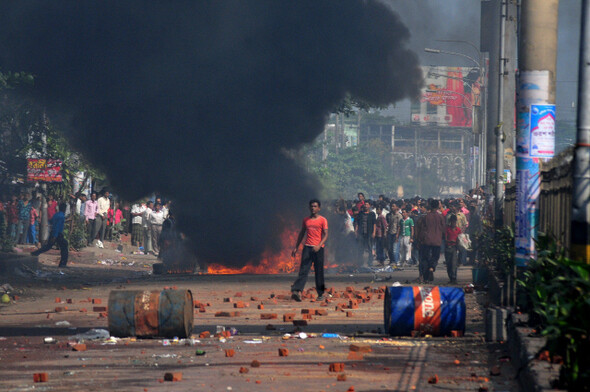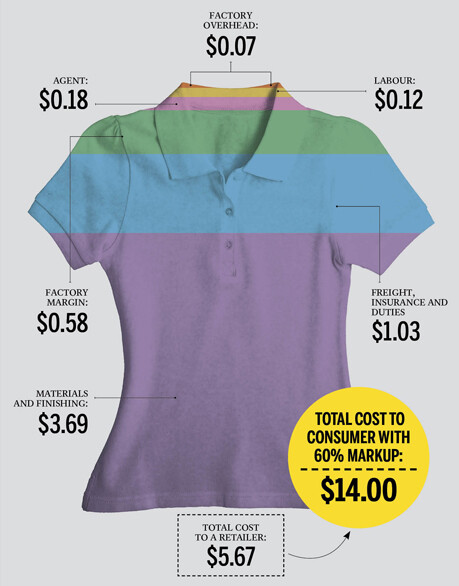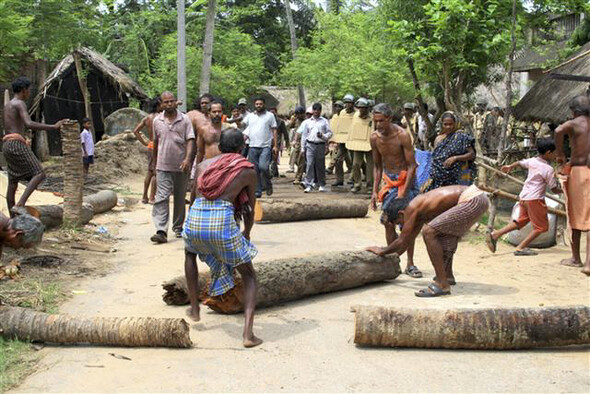hankyoreh
Links to other country sites 다른 나라 사이트 링크
[Special report- Part II] S. Korean companies’ shameful self-portrait in Southeast Asia

Forgetting can be bliss. Many South Koreans today have no memory of the role that long hours and low wages played in laying the groundwork for economic growth four decades ago. The appeal of “made in Korea” clothing of the 1960s and 1970s lay in its cheapness. As South Korean wages rose, companies began looking elsewhere. They headed to factories in China and the Philippines - borders had no meaning. Since wages have risen in those countries, the companies have started moving once again, this time to places like Cambodia and Burma (also called Myanmar). Monthly average wages for a sewing factory worker in those countries are US$150 and US$110-120, respectively - well below the US$250 in China and Vietnam.
"Even those countries are expected to see a 10% annual increase in wages, which means they would only be viable for two to three years at current productivity levels,” said Korea Federation of Textile Industries general manager Kim In-soo, who visited Cambodia and Burma for a study last year.
“That’s also the reason an association of textile companies is lobbying the local government to prevent minimum wages from going up,” Kim added.
Bad bosses are more or less the same, whether they are located near the Cheonggye Stream or in Southeast Asia: cursing at young female workers and exploiting their staff, not even giving them a bathroom break.
“When I meet people working for corporate watchdogs in other Asian countries, they sometimes tell me that South Korean companies are especially bad,” said Choi Mi-kyung, secretary general for Korean House for International Solidarity. “Basically, Korean companies are using an outdated style of labor management that harks back to the military dictatorship, and they are too proud of the economic growth that resulted from that management style.”
In other words, South Korea’s disgraceful reputation as the land of labor oppression is spreading to factories overseas.
The same name, the same shame transplanted in Southeast Asia
A terrible tragedy occurred in Apr. 2013 on the outskirts of the Bangladeshi capital Dhaka, when Rana Plaza - a building made up of clothing factories - collapsed, killing 1,127 factory workers. In Nov. 2012, a fire at a clothing factory left 112 people dead and injured. The international community responded by heaping criticism on the inadequate working conditions in clothing factories in Bangladesh.
Clean Clothes Campaign, an alliance of organizations that advocates for better factory conditions, collected signatures for a petition urging foreign companies to sign an agreement about fires and building safety at factories in Bangladesh, while European clothing brands such as Zara and H&M declared that they would stop buying from factories with inadequate safety standards. Walmart, Gap, and other North American clothing brands worked on improving working conditions by creating an alliance for the safety of Bangladeshi workers. No South Korean companies were involved in any of these campaigns.
This is why South Korean companies stand out the way they do. According to statistics collected by the Vietnam General Confederation of Labour (VGCL), South Korea ranked second in the number of strikes at foreign companies operating in Vietnam (32.15%), following Taiwanese companies (37.76%). Even granting that South Korea is the third largest investor in Vietnam and has numerous production bases in heavy industry, construction, and manufacturing, this is still an obviously disgraceful distinction.
“This phenomenon occurs not just in Vietnam, but in every country in which many Korean companies do business. Inside Korea, chaebol such as Samsung and Hyundai Motor do not abide by basic labor regulations, either instituting a no-labor union policy or relying on illegal dispatch workers. President Park Geun-hye and Samsung chairman Lee Kun-hee both talk about human rights, but they are silent on the issue of labor rights. They separate human rights and labor rights. It is even worse with people who achieved success in Korea and set up factories overseas. What chance is there that they will provide decent treatment to workers from a poor country that they regard as being inferior? As long as the basic situation inside Korea remains the same, we cannot hope for improvement overseas,” explained Yun Hyo-won, a consultant for IndustriALL Global Union (an alliance of manufacturing sector trade unions).
What happened after children sewed Nike footballs by hand
Whether this behavior represents intentional disregard of labor rights or just plain ignorance, it is still illegal. The usual company attitude toward corporate social responsibility (CSR) is to assume it means planting a few trees or building schools, without thinking it might also refer to obeying the laws about working conditions.
“Small and medium-sized companies are reluctant to get involved in CSR due to concerns about rising costs. Because they have communication issues with their workers, these problems often lead to strikes,” said Lee Young-seon, head of global CSR operations for the Korea Trade-Investment Promotion Agency (KOTRA).
Particularly sensitive problems faced by South Korean corporations include managing risk at their subcontractors and cooperating with interest groups and NGOs.
The first corporation to make an issue of human rights at businesses was Nike. When reports surfaced in the early 1990s that children were stitching footballs together by hand in India and Pakistan, Nike found itself the target of a massive boycott.
Afterward, Nike changed its system, watching closely for instances of human rights abuse in its network of suppliers. It delegated the ongoing monitoring work to independent, third-party organizations. This is quite different from the attitude of South Korean enterprises, which play dumb, insisting that they have nothing to do with human rights abuses at their partner companies.
Nike‘s painstaking monitoring has had an impact on South Korean companies, too. In 2012, Daewoo International received notice from Nike - which represented more than 30% of its earnings from 2012 - that Nike would no longer be doing business with it. Nike’s decision was motivated by reports that Daewoo International was involved with child labor in Uzbekistan. The company ultimately had to sell its factory in Busan.
Labor and environmental issues at Apple’s subcontractors are also controversial, but Apple releases a report on its subcontractors each year. After a series of suicides among workers at Foxconn in 2010 led to the discovery of serious cases of poor working conditions at the company, Foxconn opened its factory doors to a team of inspectors composed of private-sector researchers.

In contrast, South Korean companies were slow to join the Electronics Industry Citizenship Coalition (EICC), a global deliberative body for human rights management that was founded in 2004 by IBM, Dell, and other companies. Samsung Electronics became a member in 2008, LG Electronics in 2010, and SK Hynix in 2013. Member companies are supposed to ensure that they, as well as their first-tier partner companies, implement the five provisions in the EICC code of content, including labor rights, health and safety. However, South Korean companies have not been very proactive in doing this, failing to release the results of periodic inspections of their partner companies.
Of course, all European and North American companies are not necessarily “nice” capitalists. “Western brands tend to be more active at working to improve human rights violations than Korean companies, and beyond this they also tend to be more interested in ethical investment. They do this because they cannot ignore these issues, as a consequence of consumers’ boycotts and government monitoring,” said Choi Mi-kyung. “But in the end, it is Western fashion brands that drive price competition.”
The thing that traps workers in Southeast Asia in low-paying jobs is the vast transnational system of capitalism. Take, for example, a single T-shirt that customers spend US$14 to buy. If we subtract the profits made by manufacturers and retailers, as well as the material cost, only US$0.12 goes to the worker.
Another equally serious issue is the cozy relationship between businesses and governments. In countries in Southeast Asia and Africa with instable political systems, governments’ desire to hang on to foreign companies and foreign companies’ need to ask for government intervention in strikes, demonstrations, and other awkward developments go hand in hand. Multinationals end up seeming to be working against democracy. This is why Daewoo International was criticized for taking part in the gas well project promoted by the military junta in Myanmar.
A problem occurs and South Korean companies move somewhere else
“Korean companies that open factories overseas are particularly bad about ignoring labor relations and human rights violations. Rather than taking measures to head off potential problems, they pride themselves on dealing with problems after the fact. In fact, they think this saves them money. As a result, when issues such as labor disputes about wage increases occur, they respond defensively, sometimes by hightailing it to another country. They have failed to follow the example of Apple and Nike by networking with the local community and civic organizations to work on solving problems or by setting up universal norms and standards that can be applied in any country,” said Lee Jang-won, senior researcher at the Korea Labor Institute. Lee criticized South Korean companies for falling to keep up with the times.
On Jan. 16, the Asian Human Rights Commission (AHRC) criticized the attitude of South Korean companies that had threatened to sue workers for damages after the incidents in Cambodia and Bangladesh. The commission finished its proposal with the words, “an ill bird fouls its own nest.” Isn’t it time for us as Koreans to be ashamed of this twisted self-portrait that we have painted?
Please direct questions or comments to [english@hani.co.kr]
This article originally appeared at
Editorial・opinion
![[Column] Has Korea, too, crossed the Rubicon on China? [Column] Has Korea, too, crossed the Rubicon on China?](https://flexible.img.hani.co.kr/flexible/normal/500/300/imgdb/original/2024/0419/9317135153409185.jpg) [Column] Has Korea, too, crossed the Rubicon on China?
[Column] Has Korea, too, crossed the Rubicon on China?![[Correspondent’s column] In Japan’s alliance with US, echoes of its past alliances with UK [Correspondent’s column] In Japan’s alliance with US, echoes of its past alliances with UK](https://flexible.img.hani.co.kr/flexible/normal/500/300/imgdb/original/2024/0419/2317135166563519.jpg) [Correspondent’s column] In Japan’s alliance with US, echoes of its past alliances with UK
[Correspondent’s column] In Japan’s alliance with US, echoes of its past alliances with UK- [Editorial] Does Yoon think the Korean public is wrong?
- [Editorial] As it bolsters its alliance with US, Japan must be accountable for past
- [Guest essay] Amending the Constitution is Yoon’s key to leaving office in public’s good graces
- [Editorial] 10 years on, lessons of Sewol tragedy must never be forgotten
- [Column] A death blow to Korea’s prosecutor politics
- [Correspondent’s column] The US and the end of Japanese pacifism
- [Guest essay] How Korea turned its trainee doctors into monsters
- [Guest essay] As someone who helped forge Seoul-Moscow ties, their status today troubles me
Most viewed articles
- 1[Column] The clock is ticking for Korea’s first lady
- 2After 2 months of delayed, denied medical care, Koreans worry worst may be yet to come
- 3[Column] Has Korea, too, crossed the Rubicon on China?
- 4Samsung barricades office as unionized workers strike for better conditions
- 5All eyes on Xiaomi after it pulls off EV that Apple couldn’t
- 6[Correspondent’s column] In Japan’s alliance with US, echoes of its past alliances with UK
- 7US overtakes China as Korea’s top export market, prompting trade sanction jitters
- 8Hong Se-hwa, voice for tolerance whose memoir of exile touched a chord, dies at 76
- 9[Photo] Smile ambassador, you’re on camera
- 10[Editorial] When the choice is kids or career, Korea will never overcome birth rate woes